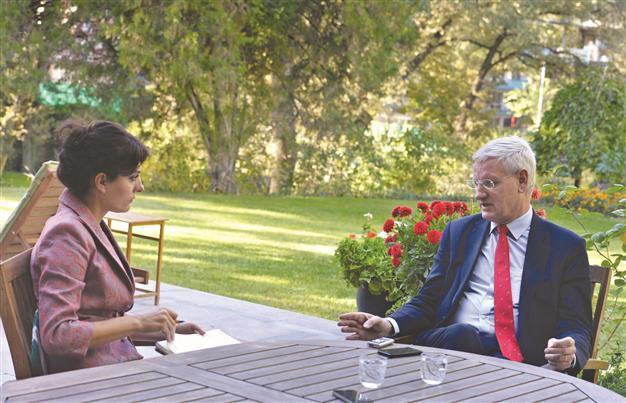Syria’s al-Assad playing for time, will eventually go: Swedish FM Carl Bildt
ANKARA - Hürriyet Daily News

Sweden’s Carl Bildt (L) says the chemical arms deal was important, however, the chemical weapons are not the only issue significant in Syria. DAILY NEWS photo, Selahattin SÖNMEZ
Syrian President Bashar al-Assad is playing on the concerns of the international community about the presence of al-Qaeda in the country, Swedish Foreign Minister Carl Bildt has said.However, Bildt told the Hürriyet Daily News on Oct. 10 that this method would not work. “No, I don’t think that [it will work] … I mean, al-Assad is clearly playing on it. But I don’t think it’s going to help him at the end of the day. But it’s going to be when we move to the post al-Assad phase in Syria, no question is going to be made to challenge what needs to be dealt with,” he said.
Bildt said he agreed with Turkey’s concerns that the recent deal between Russia and the U.S. on eliminating chemical weapon arsenals of Syria could undermine the crimes committed by the Syrian regime.
“But I think it was very important that we caught a deal,” he said. “I think that it was a complicated deal in the sense that the deal with all of these chemical weapons in a fairly short time period is going to be difficult. But I think it will happen, if it happens exactly according to the time schedule.”
Everyone should be satisfied that there is a significant commitment by all of the main actors to get rid of the chemical weapons in Syria, the Swedish foreign minister added.
“Because, otherwise, you could foresee a scenario where the regime using chemical weapons but with the continued collapse of Syria these chemical weapons could end up anywhere. So I think it is an important thing to get rid of them,” Bildt said.
Chemicals not the only issue
He also stressed that chemical weapons were not the only issue in Syria. “If we can get the political process moving towards a settlement of some sorts, my hope would be to get a sort of ‘Geneva 2 conference’ going. There is now talk about the possibility of convening sometime in November. Let’s see if that happens,” Bildt said.
While expressing skepticism about al-Assad’s claims about al-Qaeda, Bildt acknowledged that the increasing influence of such groups in Syria was a concern.
“We know that these groups are fairly opportunistic in the sense that they use opportunities wherever they find them. This particular time it happens to be Syria. We do have a problem with al-Shabaab in Somalia as well, to take another one. This is high up on our agendas now and is a source of concern and will be a source of concern in Syria for quite some time,” he said, adding that the “Arab Spring” was moving in a dangerous direction.
“I hope things are moving in a good direction in Tunisia. It’s not necessarily the biggest of the countries, but anyhow. I think Egypt is likely to go through a very difficult phase and I’m particularly worried about the political and economic aspects. There is the demographic boom in all of these countries. They need economic growth. I mean, Egypt is increasing by 1.6 million people every year and due to the political turmoil we see the economies deteriorating, Syria is a completely different story of course, the tension that is building up in the entire Levant to the south of Turkey is deeply worrying,” said the minister.
“These issues will affect all of Europe in different ways, and Turkey more. We [Sweden] had, prior to this, the biggest Syrian community of any EU country, and I still think it is the case. But it means that the links are very strong between people in Sweden and people in Syria. Even if in geography we are far away, we are closer to it,” he said.
Bildt also praised Turkey’s decision to return the land of Mor Gabriel Monastery to the Syriac community in Turkey.
“Mor Gabriel Monastery has been a particular issue in Sweden,” he said. “When President [Abdullah] Gül was in Sweden in March, he had discussions with the Syriac community about it and I think what happened with Mor Gabriel might have been one of the results of the discussions that he had in Sweden.”
















